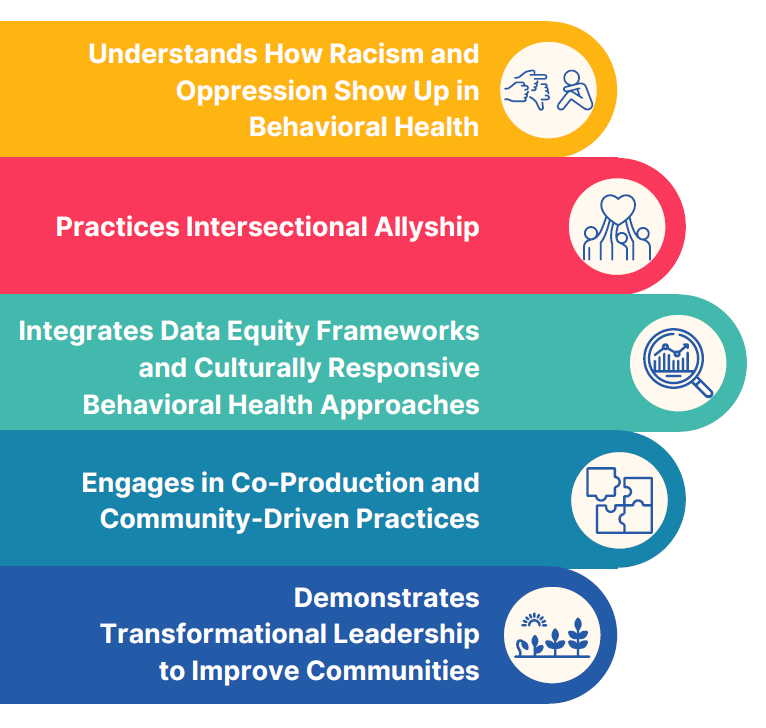What makes equity-grounded leaders different from other behavioral health leaders?
They commit to operationalizing equity and have the skills to transform the people and systems around them.
Leaders who operationalize equity:
- Support grassroots leadership and emerging, community-based groups
- Invest in community and culturally rooted practices
- Share decision-making power across sectors and with communities
- Change community factors to change health outcomes
- Take a collaborative approach to training, technical assistance, and resource allocation
- Attach funding to equity guidelines
- Examine practices and policies for implicit bias (racial, gender, socioeconomic, and others)
- Create action plans focused on equity and anti-racism
- Advance a broad regional health equity platform through all programs and policies
- Integrate and lead across silos
- Work further upstream to impact the most people
- Conduct ongoing outcomes and process evaluation
- Develop emerging leaders through mentorship and sponsorship
Specific skills and attributes of an equity-grounded leader:
- Learns from both quantitative and qualitative data—continually educates oneself
- Seeks strengths and approaching work with cultural humility
- Practices mindfulness about who is at the table—and who is not
- Being aware of how personal experiences and lineage impact views and biases
- Shares leadership and works alongside community members
- Understands and acknowledges the impact of community trauma
- Is introspective and willing to change
- Asks tough questions; calls out biases, racism, and discrimination; and challenges the status quo
- Navigates conflict with humility
- Leads with love for the mission, the people they serve, the community, and their team
Positive Impacts of Equity-Grounded Leadership
Equity-grounded leadership positively impacts organizations working within the broader behavioral health system, for individuals and communities both served by and participating in the system.
Leaders who serve from a foundation of equity can positively impact:
Organizations by
- improving employee engagement and a sense of belonging,
- increasing respect and understanding between employees and individuals served
- allowing for decisions grounded in fairness and equity, and
- improving key performance indicators (e.g., financial, engagement, quality).
Individuals by
- establishing greater confidence and trust in the behavioral health system,
- creating more culturally responsive care models,
- improving health outcomes through shared decision-making about care plans and
- addressing issues of concern based on lived experience.
Communities by
- increasing community participation and engagement,
- establishing trust and creating opportunities for shared problem-solving,
- creating pathways for economic, social, environmental, and political justice, and
- reducing health disparities and improving outcomes
Principles of Change
A backbone of equity-grounded leadership is the concept of the Principles of Change. The Principles of Change are aspirational competencies that equity grounded leaders should work toward and aim to practice. Recognizing that equity-grounded leadership is an ongoing journey, the principles will continue to evolve over time.




